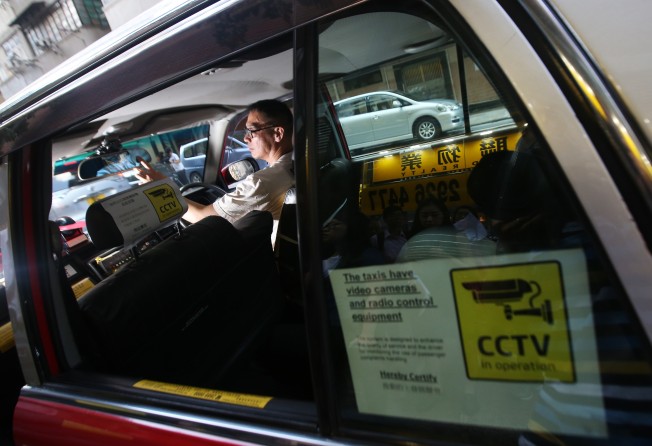Viral video of Hong Kong star Andy Hui should prompt privacy probe into taxi dashcams
- The privacy commissioner’s office should consider initiating a review of the 8,000 taxis that have already had cameras installed
- Taxi passengers have a 45 per cent chance of being unknowingly recorded on video and perhaps also on audio

The recent public revelation of the intimate moments of two celebrities videotaped covertly in a moving vehicle has triggered debate about the legitimacy of installing inward-facing dashboard cameras in this semi-private space.
In a public forum held on Sunday, a representative of the taxi trade disclosed that as a pilot scheme to regulate the behaviour of taxi drivers, they have installed cameras in 40 taxis, and passengers are alerted to these devices by stickers.
He also revealed that some 8,000 out of a total of some 18,000 taxis on the road have such devices installed on their individual initiatives. This means passengers have a 45 per cent chance of being unknowingly recorded on video and perhaps also on audio while on board a taxi. The recent incident of intrusion of privacy is merely the tip of the iceberg.
To ascertain the legitimacy of cameras in taxis under the Personal Data (Privacy) Ordinance, we need to first consider whether video and audio recording is a fair means of collecting personal data in the circumstances.
We have to balance the privacy expectations of passengers with the purported objective of the taxi trade: principally to deter malpractice by taxi drivers, such as refusing hires and excessive charging.
Is it disproportionate to sacrifice the privacy of all passengers to regulate the behaviour of a minority of taxi drivers? Are there alternative and less privacy-intrusive means of achieving the same objective?
Different people will have different views, and a determination by the privacy authority will help to remove any uncertainty for the benefit of all parties.
As the cameras in the 8,000 taxis in question are believed to have been installed covertly, it is unrealistic to wait for passengers to come forward to lodge a complaint.
In the circumstances, the privacy authority may consider initiating an investigation against these taxis. The investigator is free to choose the type and number of samples for investigation, but obviously targeting those taxis engaged in the taxi trade’s pilot scheme would be more manageable.
If the privacy authority declares after an investigation that video-cum-audio recording by such dashcams is unfair, such devices will hopefully be dismantled immediately by the 8,000 taxis in question.
Regrettably, the privacy authority has indicated that it will not undertake a self-initiated investigation.
Surprisingly, the decision was made promptly – omitting the compliance check it normally carries out for determining whether an investigation is justified.
Allan Chiang, barrister-at-law